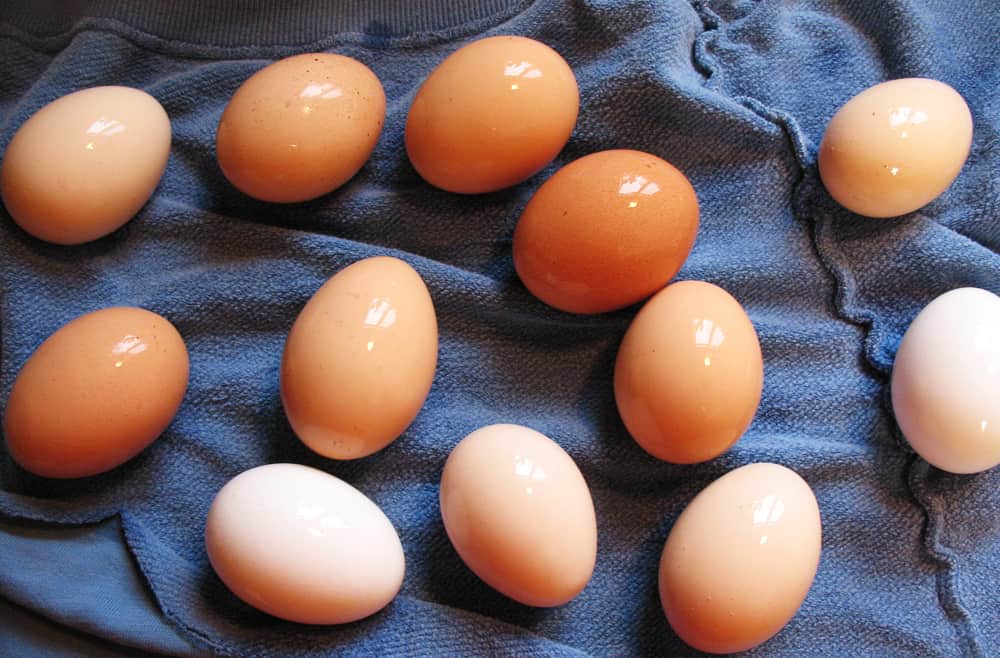 If you own chickens, you know this: No matter your best efforts, sometimes you end up with dirty eggs. Then what? It seems the issue of washing chicken eggs has two sides to the debate.
If you own chickens, you know this: No matter your best efforts, sometimes you end up with dirty eggs. Then what? It seems the issue of washing chicken eggs has two sides to the debate.
One side touts the safety issues of having dirty eggs in your food space. And it’s a good point. I mean some of the very reason we raise our own chickens and collect our own eggs is because it’s a healthier alternative—for us as well as the chickens.
The problem is, the other side has a good point too: If you wash the eggs, you destroy the natural ‘bloom’ of the egg, which is the protective coating that seals the egg up airtight. Once the bloom is gone, the egg won’t stay fresh for as long.
So what’s the answer? What you decide to do largely depends on your personal preference.
I’ve landed somewhere in the middle of the debate. I so love the idea of keeping the bloom intact for as long as possible. But, I also don’t want to use dirty eggs. So, here’s what I do:
When collecting eggs, I rub and scrap off as much of the mess as possible. Then I store them in the fridge and clean them as I use them.
If I’m selling some of those eggs, I clean them right before I know my customer is showing up to buy them (and this works for me because I only sell 2-3 dozen eggs a week and they’re just to friends, so I know when they’re coming by).
You can also help avoid a lot (but not all) of the messy eggs by collecting them often so that dirty chicken feet don’t step on already laid eggs (this also keeps them from getting broken as well as getting pecked at and eaten by your hens). Keeping your nest boxes and your chicken coop clean helps as well. This will help cut down on the dirty feet to begin with.
If you decide to wash your eggs, there’s different ways you can go about this. Here are some guidelines:
- Use LUKEWARM water. If the water is too hot, it will open the pores of your eggs and if it’s too cold it will close them (which might pull some of the contamination inside). Lukewarm water disturbs the pores the least.
- Don’t soak your eggs in water. Wash them with a cloth or paper towel, which doesn’t even have to be super wet. Damp will work.
- If you wash your eggs and are concerned about removing the bloom, you can rub olive oil on them (wipe off the excess) and it will re-establish a barrier to help protect your eggs.
- Sometimes you can remove gunk simply by using a rag or sand paper and skip the washing all together. (I wonder, though, if the sandpaper would damage the bloom? I don’t know the answer to that question.)
- Some people use soap with their LUKEWARM water when washing eggs. If you do this, try to find a soap that doesn’t have a strong scent. It could taint the taste of your eggs! There is also commercial egg washing soap available.
- Don’t put wet eggs in your egg cartons! Either air or towel dry them first or they might stick to the carton.
If you sell your eggs to others, you might not have a choice about washing them. Check with your local city hall for the rules in your area. Some are very specific (i.e. you need to wash them in a separate location—not in your kitchen—and use bleach, etc.) I’m fortunate to live in a city who lets us use our own judgment in such matters, but that’s not the case everywhere. It’s best to be safe and find out before you sell eggs to others.